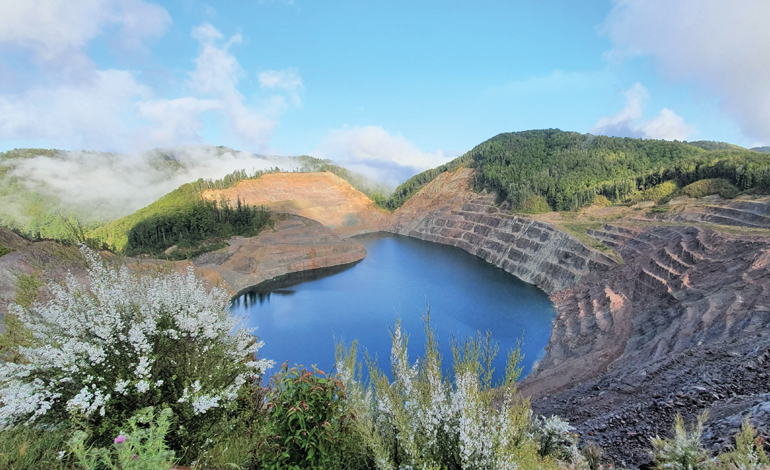Many mining companies have voluntarily set about mitigating old mining sites without obligation out of a sense of community involvement. Peter Owens looks at one such mitigating operation by Australian-based mining company, OceanaGold Corporation, at its old Globe Progress Mine near Reefton.
OceanaGold worked the former Globe Progress Mine, within the Victoria Forest Park near Reefton, from 2007 until it was closed in 2016.
Although it had no legal liability to restore the site to its original pre-mining state, the mining company has been heavily committed to rehabilitating the mine site and investing large sums of money in what is called the Reefton Restoration Project.
Still in progress, the projects includes water treatment, waste rock reshaping and landscaping, spreading topsoil and planting trees, and pest and weed control.
By the end of last year over 130 hectares (of the roughly 260 hectares of disturbance) has been completely rehabilitated at the site, including the planting of about 800,000 seedlings. An additional 200,000 beech and Manuka seedlings plus 64,000 wetland plants will be added over the next two years.
The backfill, topsoil and planting of the former Souvenir Open Pit was completed in 2018, and the beached surface of Fossickers Tailing Impoundment was capped and restored in 2019, with Beech and Manuka planted during the Spring (September-November 2019).
Once complete the impoundment will incorporate a shallow lake, which is maintained to provide a minimum two-metre water cover above the tailings surface (acting as a hydraulic seal).
There will be riparian planting of native species on the lake’s margins and a small wetland adjacent to the eventual spillway. This methodology aligns with the restoration goal to ensure long-term stabilisation of the physical, chemical, and ecological condition of the tailings impoundment.
OceanaGold has also partnered with the Buller District Council and Inangahua Community Board, and committed $250,000 to deliver projects to support Reefton into the future.
They include $150,000 over three years to fund a Socio-Economic Development Officer position, based in the Council’s Reefton Service Centre, to focus on working with the community to develop and establish projects and $50,000 to update the Reefton i-Site Interpretation Centre to celebrate the region’s rich gold mining history.
Connecting the community
That Socio-Economic Development Officer is Rachel Fifield who is now responsible for supporting projects focused on creating an economically sustainable future for the small town.

Her employer is the Buller District Council and OceanaGold is funding her role for three years. Originally from Nelson, Rachel uprooted in 2018 and moved 2.5 hours south to Reefton. Just 10 months into the role Rachel is making significant headway.
“Mine closure is not just about environmental rehabilitation and restoration,” she explains.
“Outcomes don’t end when mining stops, so my role is to work with the community to ensure their input shapes the future of Reefton and a big focus of my role and OceanaGold is to ensure the community is economically sustainable.”
Up until 2016, when the Globe Progress Mine closed, the township had been mining local goldfields since the mid-1800s.
“During production, mining companies naturally invest in the local economy by moving entire operations to town. They employ its people and use local contractors and suppliers … so when mining stops, ethically, you can’t just leave. You would leave a gaping hole, not only in the ground, but in the local market,” says Rachel.
“There’s a moral obligation – especially in small towns like Reefton – for that investment to continue, but we need look beyond direct employment and develop solutions that safeguard a more economically diverse future.”
Rachel says the community sustainability programme is governed by an Economic Diversification Governance Board, with representatives from across local government, local Maori, OceanaGold, business and the community – to facilitate and supervise the funds provided by the company.
One projects has been the Reefton i-Site’s ‘Golden Globe Theatre’, which employs two permanent and two casual staff, and provides a unique, underground mining experience for visitors.
“Tourism is important to Reefton, but not only that, the i-Site captures and protects the town’s long mining history dating back to the 19th century.”
Other wins have involved linking community members to opportunities that help secure their futures. This has involved travel funding grants for the local netball team, to new employment opportunities for people affected by job losses, to expanding a local bee-keeper’s small business by linking him to OceanaGold’s extensive Manuka varieties at Reefton.
“My role is to connect people to the right resource, or person, so they can achieve their goals,” she says.
Rachel, who also runs a design studio in the heart of town and sits on the Inangahua Community Board, says she is constantly stopped in her business activities by community members dropping in to share their ideas to secure the town’s future.
“Reefton is such a tight-knit community, which I’m so proud to now be a part of. You can see there’s a real energy in town because they have someone dedicated to helping them.”
This article was first published in the April 2021 issue of NZ Local Government Magazine.



